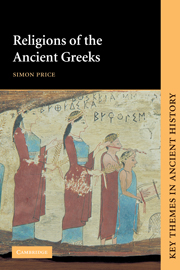Book contents
- Frontmatter
- Contents
- List of figures
- Preface
- List of abbreviations
- 1 Introduction
- 2 Gods, myths and festivals
- 3 Religious places
- 4 Authority, control and crisis
- 5 Girls and boys, women and men
- 6 Elective cults
- 7 Greek thinkers
- 8 Reactions to Greek religions
- Appendix of Greek inscriptions in translation
- Bibliographical essay
- Bibliography
- Index
4 - Authority, control and crisis
Published online by Cambridge University Press: 05 June 2016
- Frontmatter
- Contents
- List of figures
- Preface
- List of abbreviations
- 1 Introduction
- 2 Gods, myths and festivals
- 3 Religious places
- 4 Authority, control and crisis
- 5 Girls and boys, women and men
- 6 Elective cults
- 7 Greek thinkers
- 8 Reactions to Greek religions
- Appendix of Greek inscriptions in translation
- Bibliographical essay
- Bibliography
- Index
Summary
‘Polytheism’, in contrast to Christianity or Islam, is often seen as a tolerant and open religious system. It is associated with amateur priests, who lacked authority, and with an absence of dogma, orthodoxy and heresy. Already having many gods, it is attributed the capacity to accommodate even more at any time. This romantic view of Greek religious liberalism has little to commend it. The absence of dogmas did not entail that anything was permitted, nor was the pluralism of gods open-ended. In fact the terms ‘polytheism’ and ‘monotheism’ are unsatisfactory (above, p. 11), and the issue of tolerance/intolerance is anachronistic. As a matter of state policy, religious toleration does not predate the eighteenth century. The best way forward to understand this issue is to examine religious authority and responses to religious crisis. The chapter sets the scene for Greek cities in general, and then concentrates on Athens, largely because the Athenian evidence best illuminates the issues.
RELIGIOUS OFFICIALS
Priests were an essential component of every Greek state. Aristotle's Politics, an analytic study of the fourth-century Greek political community, includes among the necessary offices of the state superintendents of religion, namely priests and, especially in larger states, a range of officials concerned with the performance of rites, the upkeep of temples and religious accounts, and also civic magistrates who were responsible for religious festivals (1322 b.18–29; cf. 1328 b.11–13).
- Type
- Chapter
- Information
- Religions of the Ancient Greeks , pp. 67 - 88Publisher: Cambridge University PressPrint publication year: 1999

